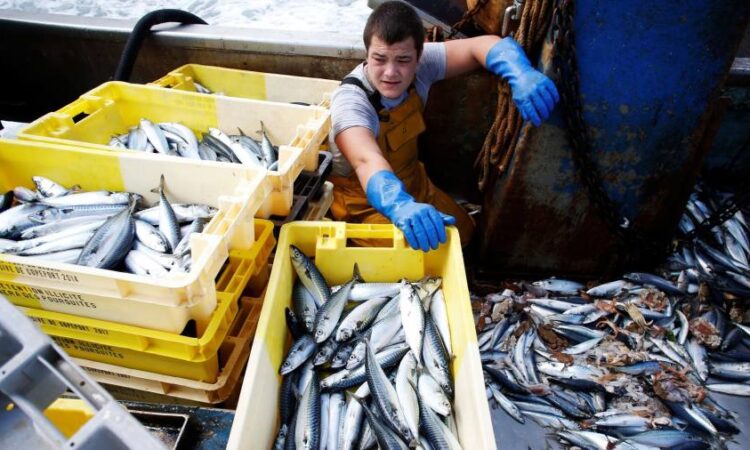
A new fishing deal between the UK and EU threatens the sustainability of vulnerable fish stocks and goes against international scientific guidelines, environmental campaigners have said.
The accord, the third signed by London and Brussels since Brexit, is part of an agreement to gradually increase the share of stocks allocated to UK fishing boats in shared waters.
Under the deal, the UK fishing industry will be allowed to catch 140,000 tonnes of fish worth more than £280mn in 2023, the government said on Tuesday. While the allocation remains the same as this year’s, its expected value is down from £294mn.
“These catch limits show that the mismanagement of UK and EU seas is set to continue,” said Charles Clover, executive director of the Blue Marine Foundation, an ocean conservation charity.
He added that the allocated catch limits for half of the shared stocks were above the sustainable level advised by scientists, he added.
“Some of the limits agreed are better than last year . . . but it is clear that the parties have again agreed to allow significant and demonstrable overfishing in the face of scientific evidence and their own laws.
“We were assured repeatedly that this would not happen after Brexit. Well, wake up everyone, it is happening,” said Clover.
Oceana, a charity, said both sides had allowed west of Scotland cod, Irish Sea whiting, and Celtic Sea herring, among others, to be overfished.
“While both parties adhered to the science for some stocks, we deeply regret their inability to take the right decision for stocks in the poorest conservation state,” said Vera Coelho, senior director of advocacy at Oceana in Europe.
“Overfishing is decimating fish populations in UK and European Union waters. Cod numbers in the Celtic Sea, Irish Sea and off the west of Scotland have plummeted over the years and are at risk of collapse if urgent action isn’t taken,” she said.
Under the deal, the EU fleet can land 350,000 tonnes of fish, estimated to be worth about €1bn based on historic prices adjusted for inflation, according to the European Commission.
The distribution of fishing quotas, agreed when the UK left the bloc in January 2020, is fixed. However the total catch allocations are negotiated annually after taking scientific advice. The Trade and Cooperation Agreement signed in 2020 ensures the UK share increases by 25 per cent in 2021-26.
The UK said that “wherever possible” catch levels have been set in line with, or lower than, the level advised by scientists at the International Council for the Exploration of the Sea.
The proportion of catch levels that align with Ices’ recommendations has increased by an estimated 13 percentage points compared to last year, showing a modest improvement in efforts to meet environmental limits.
In 2022, the catch limits for 65 per cent of the shared fisheries were set above scientific guidance, falling to 52 per cent this year.
UK fisheries minister Mark Spencer said: “Our agreement with the EU secures valuable fishing opportunities for the UK fishing industry while cementing our joint commitment to manage fisheries sustainably.
“These decisions are based on the latest scientific advice to help protect key fish stocks with the long-term health of the marine environment at the forefront of our minds,” he said.
Virginijus Sinkevičius, EU environment commissioner, said: “Today’s deal will secure fishing opportunities for fishermen and women, and support the livelihood of coastal communities.”
He added: “It will advance the sustainable use of shared marine living resources, provide certainty for our fishers for the year ahead and establish a strong basis for continued co-operation in fisheries management with the UK”.






